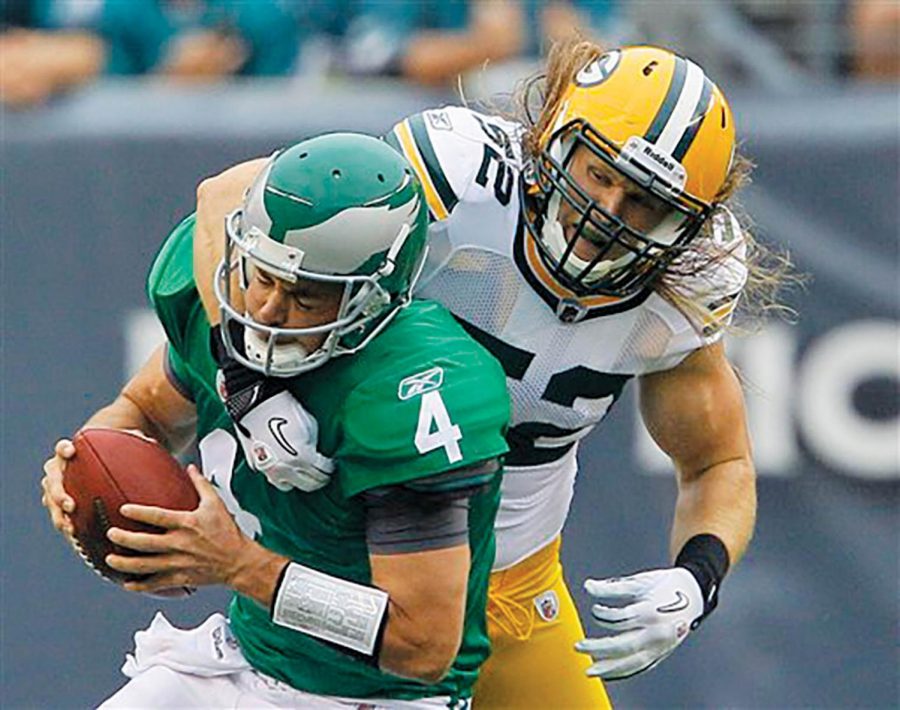FACEOFF: Are new tackle rules making the NFL “too soft”?
Clay Matthews (right) is just one of the latest defensive players penalized for new rules.
YES:
Ask any young player what their favorite part of playing the game of football is and one would likely hear, hitting people. While hitting may be a vital part of the barbaric nature that is so beloved in the game, in order to combat detrimental injuries, the NFL has increased penalization to hits that could possibly lead to concussions or other excruciating injuries.
The NFL approved the broadening of the helmet-hit rule that will penalize players who lead with the crown of their helmets to initiate contact against an opponent on any play. Offending players would be penalized 15 yards and may be disqualified depending on the severity of the hit. With the introduction of such rules, game officials have been a bit trigger happy with what they consider roughing the passer, the helmet-hit rule and other similar contact rules.
And while these rules might make logical sense being that they are protecting the medical interests of the players, the game itself is at risk with these rules in place.
The new roughing the passer rule for instance, states that defensive players are not allowed to punish or stuff a quarterback or lay on him with body weight. With such stipulations in place it requires players to tackle in a way that risks the potential of making a clean tackle or issuing a tackle at all. The helmet rule, on the other hand, is highly controversial. Critics of the rule argue that if a player were to only lower their helmet, unavoidable contact with another player would be made.
Thus arising the question– how should a player tackle? What has long been considered clean tackling is now being penalized. Fans can’t stand these rules as they sense they are detrimental to the game.
What has formerly been considered tackle football is now starting to feel like flag football. With the season just five weeks in, there is skepticism on the progression of the season with the new penalizations in place. Many fans want the league to revert back to the smash-mouth style of play with tremendous ground shaking hits; However, with the health of individuals at risk, the game of football is left at a divide.
Fans are tired of the constant flags and desperately miss the style of play in years past. Many of the famous hits of years past would undoubtedly be considered a penalty in the current NFL. Fans tune in to see touchdowns and bold force. While the health of the athletes is a priority, is risking the fundamentals of football a good solution to the problem at hand? Football by no means is non-violent; The game was built on violence. Is the NFL risking its foundational principles with these new penalties?
NO:
The NFL is trying to save its players. The amount of concussions seen in the last four years is a brutal reality of the sport. With these new rules, the NFL could save their valuable employees’ brains.
The NFL has seen an average of 176 concussions per season for the last four seasons. To put this into perspective, the NBA saw an average of 13 concussions per season over the same timeframe and the English Premier League recorded 14 in the 2017 and 2018 season.
The NFL is a business first and foremost. NFL teams are in the business of investing in people, and they invest a whole lot of money.
NFL players make $2,700,000 per year on average. It’s in the best interest of the NFL and the teams which make it up to protect their costly investments. These rule changes are an effort to do just that. By protecting the players who make up the league, the teams are able to keep paying their most valuable players and keep them out on the field.
The league has lost Le’veon Bell– one of their most valuable players– at the expense of violence. With rules to protect players and ensure long-lasting careers, the NFL could make cases like Bell’s work out for the player and the team.
Most of the controversy surrounding the new softness of the NFL is due to one of their officiating points of emphasis in protecting the quarterback. Quarterbacks are paid $7,100,595 on average, making them the most valuable player on the field. It should be obvious why the NFL is making an extra effort to protect the quarterback.
Quarterbacks are paid more than the average player because of the role that comes with the position. For teams, losing a quarterback is a loss of guaranteed salary money but more importantly, it lowers the value of clubs as a whole. Quarterbacks need to be protected in order to protect the value of NFL clubs and in turn, the NFL altogether.
The unfortunate truth of America’s favorite sport is that it leaves its players vulnerable to injury– but injuries can be avoided. By implementing new rules to protect the players, the NFL is not only protecting the sport of football, but the lives of the people who play it.


